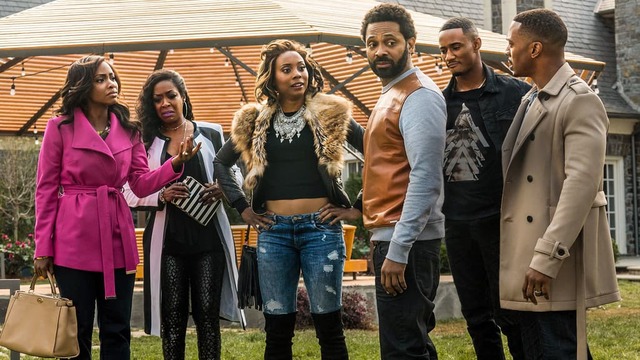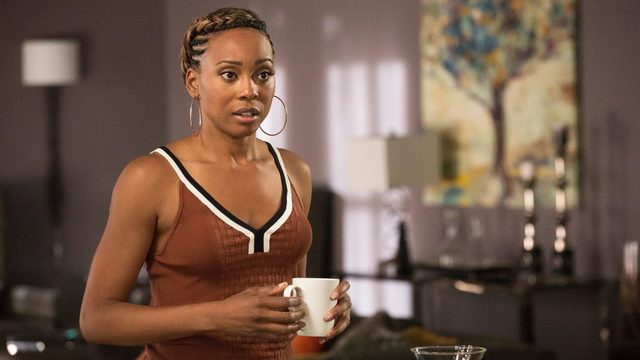We lost an important lesbian character on television in October.
No, she didn’t die. But we lost her all the same.
Mary Charles Calloway, played by actress Erica Ash, was a force of nature from the premiere episode of Survivor’s Remorse up until it’s very last. Mary Charles, better known to her family and friends as M-Chuck was the older sister of the show’s protagonist, Cam Calloway.
Survivor’s Remorse followed Cam as he grappled with his sudden stardom after signing a multi-million-dollar contract with a fictional NBA team in Atlanta. Cam’s fortified by a small network of family and friends, including M-Chuck, as together they navigated the pitfalls of race, stardom, wealth, and community responsibility. The cast was rounded out by black comedy legends Tichina Arnold as Cam’s mother, Cassie, and Mike Epp’s as his Uncle Julius.

The brilliance of Survivor’s Remorse laid in its deceptively simple premise. Despite my brief description above, it was not really a sports comedy. It used sports as a launching pad. Instead of succumbing to tired clichés of bling and boobs, Survivor’s Remorse was witty, dark family comedy unafraid to push the envelope in terms of content, style, and tone. The show was a brainchild of actor and writer Mike O’Malley (yes, Kurt’s Dad from Glee) and attracted young black talent in the writing room as well as respected black directors such as Debbie Allen and Salli Richardson Whitfield. Did I mention that it was Executive Produced by LeBron James? Despite being less well-known than its peers, Survivor’s Remorse enjoyed high critical praise over the course of its four seasons. Still, it was unceremoniously cancelled by Starz due to low ratings, airing its final episode with little warning to fans on October 15th.
Survivor’s Remorse is an odd name for a comedy. On first read, it feels most applicable to Cam leaving behind his impoverished black community in Boston and his subsequent difficulty adjusting to newfound affluence in Atlanta. However, with time, each member of his family has their own survival tale.
M-Chuck is introduced as delightfully profane, crude, foul-mouthed. She’s undeniably charismatic and funny. She’s also fiercely protective of her brother, even when his fame sucks all of the air out of the room. She’s always on the prowl. In fact, she’s a womanizer. If The L Word’s Shane was black 20something with blonde highlights and thick Boston accent, she would still find competition in M-Chuck. In later seasons, we watch as she copes with the intergenerational trauma of her mother’s rape that resulted in her conception. You’re not going to find another character like her on television.

M-Chuck doesn’t exist solely on the sidelines. She’s connected to her family and most of the core plot lines. She also has her own separate character development. Even though M-Chuck is perpetually single, the show never brushes aside that she’s gay. Her revolving conquests are running joke of the series, often opening up space for multilayered political commentary. In season two, while the Calloways tour a Georgia plantation, M-Chuck beds the white actress playing a slave owner. At a time when narratives persist that homophobia is somehow worse in people of color communities than those of our white peers, her family unconditionally loves her.
In the show’s first season, the Calloways are looking for a new home church for their family after moving to Atlanta. M-Chuck brings her current girlfriend of the moment along, holding her hand and gently rubbing her thigh while they sit together in the pews. After the service, the minister approaches Cam and explains that while his sister is welcome to join the family in church, her gayness is not. The Calloways balk at the suggestion, first attempting to find middle ground with the minister and hoping to make the church more inclusive. The following Sunday, matters become more extreme. The minister’s sermon becomes a vitriolic anti-LGBT hate tirade. In response, M-Chuck stands up, yelling, and throws the Bible and church hymnals. She’s livid and willing to go down fighting if it means protecting her own humanity. The ensuing calamity is hilarious, but it’s also poignant to watch as the entire family stand by her side. They leave the church together, recognizing that if one of them isn’t welcome, then truly none of them are.
Throughout the third season, M-Chuck sees a therapist to help with her rage. As a result of these sessions, she begins to question her origin story. Cam’s father is incarcerated and rarely spoken of, but M-Chuck has never met her father at all. She starts by gently prodding her resistant mother, eventually getting her join along in therapy. In the third season finale, we learn a tragic family secret. As a teenager, Cassie was raped by three boys at a party. She is unsure which of those men “fathered” M-Chuck and has pushed the unspeakably painful night far from her memory. Erica Ash and Tichina Arnold are nothing short of a gift as they uncover new layers behind Cassie and M-Chuck following the revelation.
In the show’s post-mortem, Mike O’Malley discussed that he saw M-Chuck coming to terms her birth story as part and parcel of her settling into a long-term relationship. He expected Survivor’s Remorse to continue for another season or two and M-Chuck’s future would’ve included “being in a happy relationship, a committed relationship where she settled down… She would have been a great mom.” I agree that she would have been, but it’s a future we will never see. Survivor’s Remorse wasn’t perfect. It lost a certain spark following the death of a central character in the second season. In later seasons, the show — which was always a dramedy — leaned towards the dramatic with mixed results. But, it certainly had more story left to tell and I am saddened we will never get to experience it.
The importance of M-Chuck’s existence as a lesbian character on a primarily black television show cannot not be overstated. Most queer women of color on TV exist in white spaces. Take Kat Edison on The Bold Type or Pretty Little Liar’s Emily Fields as highlighted examples. While The Bold Type and Pretty Little Liars have developed a loyal queer fan base, both of these women are the only woman of color in their social circle. They, and the majority of other queer women of color on television, occupy a position that borders on tokenism. Though Kat is currently dating Adena El-Amin and Emily previously dated Maya St. Germain, both women of color, neither of these love interests were added to the main cast of their respective television shows. This is not necessarily reflective of the ways that queer women of color move through everyday lives. Many queer women of color live and love in majority people of color communities, places they aren’t the only black or brown friend and were conversations are not defaulted back to central whiteness.
In season four, Cassie begins a weekly live video podcast. In one episode, the broadcast is usurped by Cam’s girlfriend Allison, who wishes to talk about class and social discrimination internal to the black community. Despite Cassie’s protests of going off topic, M-Chuck joins in. She adds that black homophobia contributes to black queer folks feeling isolated from their community at large. When the podcast’s engineer points out that white people are also guilty of homophobia, M-Chuck concedes the point but also notes that white people are auxiliary to the conversation at hand. When Cassie tries once again to reroute the discussion back to the week’s scheduled topic, M-Chuck will not be deterred. She wraps up the debate, “If we are all a part of one big black community, a lot of us hate a lot of other of us.”
The conversation showcasing multi-dimensional black thought, and questions of isolation or not feeling “black enough”, is one that a lot black people are familiar with. It’s smart and nuanced. It’s also a conversation that fundamentally could not be filtered through a white lens. It could not exist on a television show that wasn’t like this.
Having black queer characters on a television show like Survivor’s Remorse not only allows for greater depth in conversations on screen. It also means that black audiences and young black queer people who won’t necessarily find their home watching The Bold Type, Pretty Little Liars, or Wynonna Earp still get to see themselves. A USA Today backed-analysis of 2017 Nielsen television audience data found that no single program ranked in the same top five among white, black, Asian, and Latinx viewing audiences. It matters that representation is found across all platforms, that it can reach as many people as possible. Whoever you are, and whatever stories you choose to consume, you should have an opportunity to see yourself.
In many ways, we are in the middle of an exciting time for black diversity on television. Comedies like Black-ish, Atlanta, and Insecure, along with dramas like Queen Sugar, are garnering critical praise. Black led primetime soaps such as Scandal and Empire have found mainstream ratings success. Combining network television and cable, there are more black-led shows on air right now than at any other point in the last 20 years.
Which brings me to the question: How may black queer women have been granted a central role into this new wave of television renaissance? How many black queer characters are even regularly seen on television right now, across the board? Orange is the New Black murdered Poussey Washington and constantly leaves both Suzanne Warren and Sophia Burset in peril; Sense8 gave us Amanita Caplan over two seasons before being cancelled by Netflix; Queen Sugar’s Nova Bordelon’s queerness has thus far withered into nothing but a blip in its second season; Starz’s other black television mainstay Power murdered its lesbian character Jukebox, played by Anika Noni Rose, just last summer. Black-ish’s lesbian aunt, played by out actress Raven Symoné, only shows up roughly once a year. While Empire has a black gay lead in Jussie Smollett’s Jamal, they completely sidelined their black lesbian character Freda Gatz and murdered Naomi Campbell’s black bisexual Camilla Marks-Whiteman. Denise on Master of None is used incredibly effectively, but admittedly sparingly. M-Chuck was a member of an incredibly tiny, and rapidly shrinking, cohort.
When asked about the possibility of including a black LGBT character on her show Insecure, Issa Rae remarked, “it’s just about figuring out the right way to do that… There’s so many topics we wanted to explore but, at the end of the day, we are just trying to tell a good story without anything feeling forced.” I’m not singling out Rae; she’s certainly not the first showrunner to make such a response. The problem is that LGBT storylines, and black LGBT storylines in particular, are still considered special or exceptional cases. We’re rarely given the opportunity to be seen on television as the everyday people we are in our regular lives. It’s simply not unfathomable that Issa Rae’s millennial black single girl living in Los Angeles would have at least one black gay or trans friend. Anymore than it was unfathomable for Cam Calloway to have a gay sister named M-Chuck.
And last month she was forced out with barely a whimper. Which is both ironic and upsetting for character who was absolutely always nothing short of a bang.







